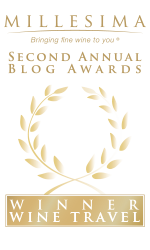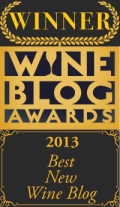
All images by Lauren Mowery.
If you missed my article in the Village Voice…
Halfway between L.A. and San Francisco, bucolic Paso Robles has exploded with wineries over the last twenty-five years. The region, long home to cowboys and farmers, grew from a handful of pioneering grape growers who arrived in the late Seventies to over 200 hopeful winemakers working in eleven recently delineated American Viticultural Areas (AVAs). Although new plantings have stalled due to serious water woes, to locals and visitors, vineyard saturation is palpable, especially when driving along one troublingly expansive, deep-pocketed project. But to East Coast drinkers, the area’s wine boom has largely gone unnoticed.
Because most of Paso’s wineries are small to mid-size, their offerings rarely penetrate the competitive, Eurocentric NYC market. Only a few famous names stick in the minds of drinkers. For example, Justin, known for its red Bordeaux “Isosceles” blend, and Saxum Vineyards, the label that earned a Wine Spectator Wine of the Year award in 2010, put Paso on the map for wine collectors. Tablas Creek, a successful endeavor founded by the Perrin family from Châteauneuf-du-Pape winery Château de Beaucastel, helped drive the red and white Rhône blends that have come to characterize the area’s wines. Now, with the expanded reach of direct-to-consumer (DTC) shipping and growing interest from local retailers, New Yorkers can tap into Paso’s wealth of up-and-coming, boutique brands.
“Paso Robles is an interesting alternative to other California regions because there is a lot of experimentation going on with different grape varieties right now,” said Jennifer DiDomizio of downtown Manhattan retail shop California Wine Merchants. “Of course there are the Rhône varieties and the more traditional zinfandel and cabernet sauvignon, but we are seeing more French, Italian, and Spanish grapes and blends coming out of Paso.” DiDomizio also noted Paso’s big improvements in quality, “particularly as producers match their micro-climates to suitable grape varieties. I’ve heard very high praise for these newer projects, and there is an excitement about the energy that a new generation of winemakers are bringing to the region.” California Wine Merchants currently sells a handful of Paso wines, and rotates its selection regularly, but DiDomizio said the percentage of Paso wines in the shop will continue to grow, reflecting the region’s dynamic growth.
From Italian grapes and organic vineyards to unique bottling methods, here are six exciting Paso wineries to watch, all now available at your doorstep.
Giornata
Tucked into the back of Tin City, an industrial zone recently revitalized by a flurry of new tasting rooms, Giornata specializes in varietally correct Italian grapes stamped decorously by the California sun. A darling D.I.Y. clan, because of their practical-and-fun-and-good-for-the-environment ethos, owns the winery. Husband and wife Brian and Stephy Terrizzi, along with their small children, take a hands-on, sustainability-minded approach to every facet of the business, from the vineyard to the cellar. The family even uses a bicycle-powered grain mill (read: good for exhausting energetic kids) to experiment in making flour from locally grown whole grains.
Giornata produces the finest American iterations of nebbiolo and barbera I can recall tasting. “Joyful” is not an adjective I use often in a note, but the 2014 Barbera’s ($25) electric cherry fruit and silky texture elicited the descriptor. Even a simple white, the 2014 Il Campo Bianco ($20), provided delights in its floral and citrus echo of an Italian garden, and over-delivery on price.
Alta Colina
This small, family-run estate winery in West Paso focuses, like many, on Rhône grapes. Founder Bob Tillman departed the high-tech business world after 35 years to launch the label in 2003, and claims to embrace “the big, extracted style that naturally follows from this terroir.” I found the wines robust, but not pushy, which I attributed to their impeccable balance. For example, the 2011 Toasted Slope syrah ($45), featuring a splash of viognier à la Côte-Rôtie, pushed the boundaries of alcohol on the label, but not in the glass, where traces of booziness floated effortlessly away into a perfume of smoke and blackberries.
Tillman and his daughter Maggie, who runs their marketing program, believe in long-term stewardship of the land, and thus converted the entire mountain farm to organic. “It is a way of life, not just a business,” Tillman explained, adding that “this enterprise is intensely personal. We are constrained by only two things: The fruit must come from our vineyard, and we must be self-financed.” In addition to syrah, Alta Colina produces a viognier and grenache blanc for its whites, and a range of GSMs (grenache, mourvèdre, and syrah blends) and petite sirah.
While limited direct shipping is available, their NY distributor is Wine Source Group.
Field Recordings
Canned wine might not seem like the obvious choice for a dinner party, and perhaps it’s best left relegated to pool, park, and beach events where glass is prohibited, but the juice inside this innovative company’s packaging is worthy of a glass bottle.
The winery name, Field Recordings, came from analogizing the term used for audio recordings produced outside of a studio, and often of natural occurrences, to the thought process behind the vino — “the wine being the stories of people, places, and grapes, captured in a bottle,” explained founder Andrew Jones. With regard to using an aluminum conveyance, Jones said he was impressed with all the positives he discovered when researching the canning process. “It is extremely gentle on the product versus a bottling line, it is infinitely recyclable, it provides huge savings to the end consumer, and overall, it is the most convenient packaging around for enjoying wine,” he said. Not all of his offerings come with a pull tab (most don’t), but the FICTION blends, like the red made from zinfandel and a vintage dependent rotation of five to seven other varieties, do. FICTION white and a rosé are also available. Four 500 mL cans are $40.

The Kentucky Ranch Barn owned by Thacher Vineyards
Tired of working as a Silicon Valley cubicle drone, Michelle, along with her brewmaster and winemaker husband Sherman, sought to leave their urban lifestyle in Santa Cruz permanently. In 2006, they purchased an old horse ranch in the Adelaida area of Paso Robles, and opened a winery and tasting room by 2008. “We showed up and it was trial by fire,” said Sherman, “but we embraced it.” Despite the picturesque backdrop of dips and hills, complete with a historic barn emblazoned with “KR,” denoting “Kentucky Ranch,” the emblem of the former owners, Thacher buys most of their grapes. Their land isn’t as suitable for farming as it is for photographing. But the world of fine wine has proven repeatedly that solid grower contracts can be as good, if not better, than estate fruit.
Uniquely for the area, Thacher produces a medium-bodied, savory, tea- and spice-evocative 2012 mourvèdre ($45). Blended with a dollop of lively, strawberry-leather-scented grenache, it’s a nice break from the rich, fruity overtones of the region’s reds. The 2013 grenache blanc ($28), from La Vista Vineyard, also offers a refreshing take on this local white grape, with its bright salty-lime- and green-apple-soda-tinged flavors.
Ranchero Cellars
Ranchero Cellars is the tiny, personal label of Amy Jean Butler (only 650 cases a year), who is better known for making other people’s wine. Butler adheres closely to the wishes of her clients, but when it comes to her grapes, which she buys through longstanding contracts, she strives for an acid-driven, restrained style — a tough combination to find in Paso.
Butler learned to love acid, she says, working at California sparkling house Schramsberg, and her wines prove it. The 2014 grenache blanc “chrome” ($28) rips with zippy citrus fruit, and her 2013 La Vista Vineyard viognier ($30) portrays the leaner, more delicate side of the too often blowsy grape. But Butler’s real passion project is working with little-respected carignan, or, as she describes the grape, “the wild, brambly, and gnarly red beast.” Her vivid 2012 Carignan ($32) expresses crushed blackberry Pez and an herb crust akin to one you might find on a lamb roast. If the description sounds weird, the wine tastes delicious.
Purchase wines online or contact NY distributor Vine Collective.
Clos Solène
Successful wine brands have compelling backstories, made more so when the tale incorporates true romance with a superb product. Such is the case for Clos Solène, a label born of two aspiring French winemakers, lovestruck Guillaume and Solène Fabre. Clos Solène began in 2007 with two barrels housed in a nearby winery; doubling in size each year, the pair now have their own tasting room in Tin City.
Their wines are unabashedly voluptuous, embracing the region’s propensity for naturally high alcohol without transforming the Rhône grape-based blends into diesel fuel (unlike a few of their peers). Flavors are intense, like the red-berry-concentrated 2013 La Petite Solène ($65), an SGM. While the wines sit at the top of the price pyramid for the region, they have received critical acclaim, resulting in regularly sold-out offerings. Production amounts are small, so if you love their wines, join the mailing list.

Afternoon view of vineyards on Paso’s east side
















